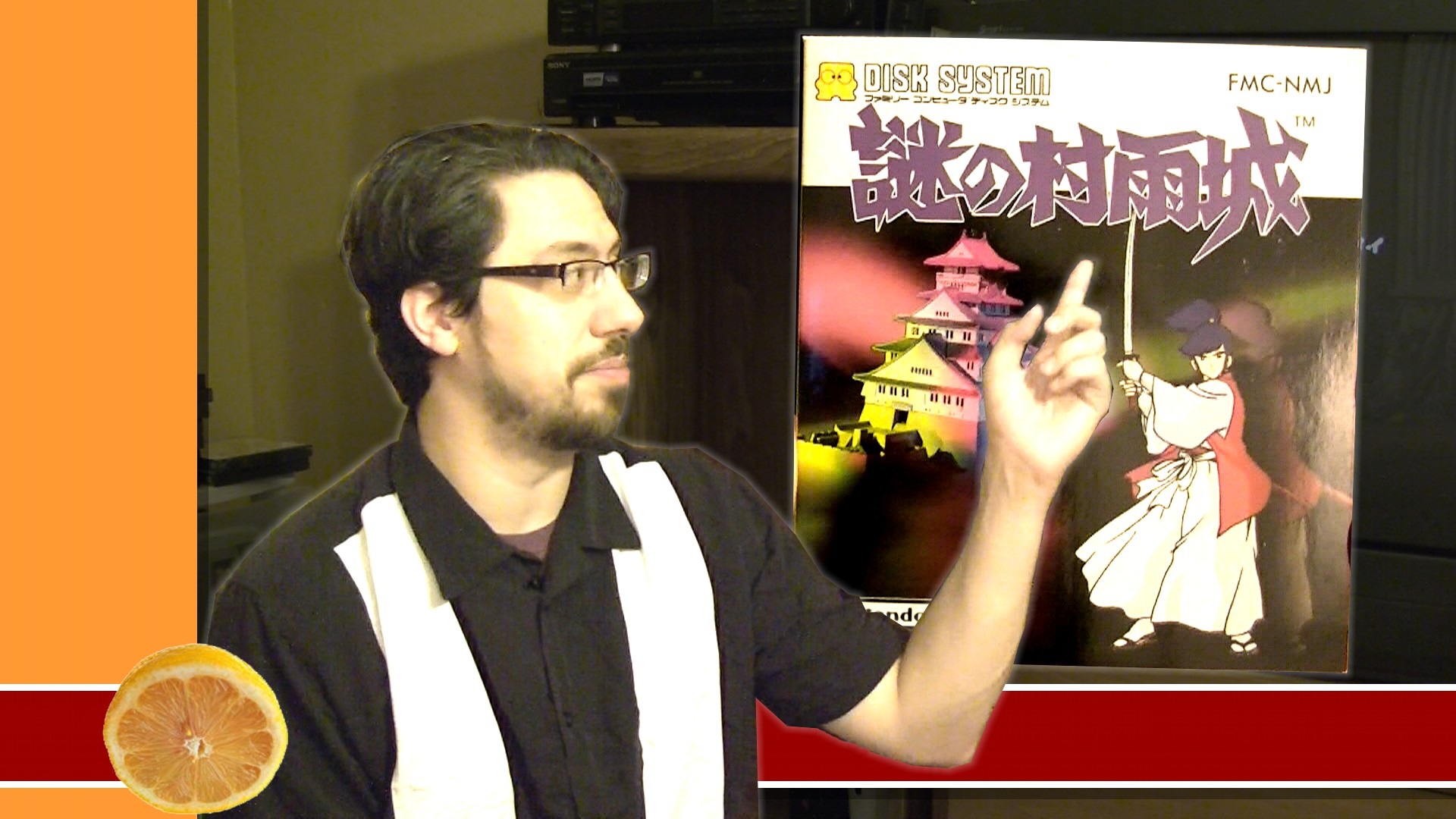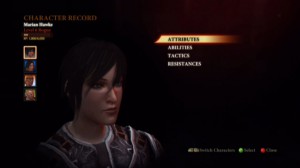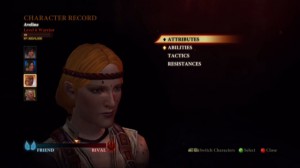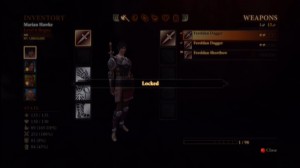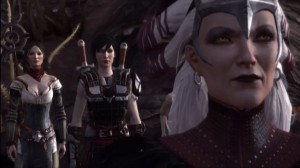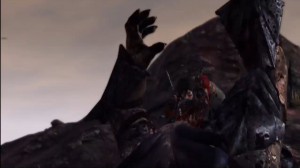Top 5 Unique Features to Keep in Dragon Age 2
by Sean "TheOrange" Corse, filed in Games, News on Mar.01, 2011
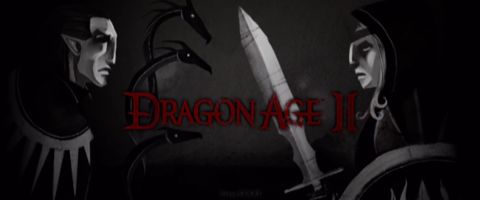
The next installment of BioWare’s epic fantasy RPG will be out in just one week. After the Dragon Age 2 demo went live last week, fans are already alternately welcoming and decrying BioWare’s moves to make this property more like its Sci Fi cousin Mass Effect.
After we saw the first impressions from Game Informer and preliminary reviews from GamesCom last year, I put together a list of five unique features of Dragon Age: Origins that I hoped would not get trampled in that process. We’ve only seen the demo so far, but we can already answer most of those questions.
So how does Dragon Age 2 fare compared to its Origins? Read on!
1) Keep the Paragon/Renegade bar AWAY
One area where I believe Dragon Age is superior to Mass Effect is how your choices are reflected through the nuance of your interactions with the rest of your party. If you say or do something one or more of your party members don’t like, they will make it known. They will also try to influence your more difficult choices along the lines of their particular proclivities. (Of course, some characters may be just as ambivalent as you, and turn out to be no help at all.)
The strength of this system is that the effects of your decisions become much more personal; a noble goal of any game striving for an immersive experience. Favorable and unfavorable reactions to your decisions range from mild annoyance (and a subsequently small gain/loss in esteem from said colleagues) to a rift so dire that you may find yourself having to slay a dear friend in order to complete your mission. The choices you make as your character progresses through the world are reflected in how highly these characters come to regard you, and which ones you choose to be in your party so as not to draw their ire (despite any favorable abilities they may have) — assuming you choose to keep them around if they annoy you that much.
By comparison, Mass Effect offers an abstract, colored bar, with “The Game” judging your actions as definitively “good” or “bad”. The new ME-like dialogue wheel somewhat fits into this model, with the top response showing a halo logo (“Paragon”) in the center of the wheel, while the bottom choice is a red fist (“Renegade”). In somewhat of a departure, the middle choice tends to be a whimsical response
How did they do?
SUCCESS
 From the demo, there still doesn’t appear to be anything equivalent to the Paragon/Renegade bar on the character screen for Hawke.
From the demo, there still doesn’t appear to be anything equivalent to the Paragon/Renegade bar on the character screen for Hawke.
The only potentially-iffy bit is how the dialog system explicitly labels Paragon and Renegade choices. Is there more to it, or does it just clarify the choices you already had in Origins? Any deliberate decision points have seemingly-neutral iconography, which hopefully means once again it’ll be left up the characters to judge your actions and not the game at large.
2) Party Control
Your main character can fall in battle while the other three members of your party fight to victory; as long as one character survives, victory may be yours. This is because, unlike Mass Effect, you are able to directly control any party member directly to use their full range of abilities and equipment — particularly useful for unlocking chests (if your main isn’t a Rogue), or casting Area of Effect spells at a moment’s notice (if not a Mage). The revelation from GameInformer that the control scheme in the console version would be different from the PC immediately made me wonder if we’re not going to see something like Mass Effect where you can’t control the other characters directly.
By comparison, Mass Effect ends as soon as Shepard falls. Then again, Mass effect is more focused on its shooter mechanic than the melee-heavy Dragon Age. There is nothing like snatching victory from the jaws of defeat as your mage whittles away slivers from a seemingly-relentless ogre. Likewise, letting a party member or two fall can be part of a strategy in Dragon Age, where a fighter might be ill-suited to a certain combat situation, and just become a drain on resources. Losing this aspect of combat would be detrimental to my gaming experience.
How did they do?
GREAT SUCCESS
 This seems virtually identical to Origins. Full party control is retained (the demo even makes an effort to let you know you can switch between party members). The only noticable difference is that you have to keep pressing the A button every time you want to perform a melee attack. This appears to let you chain your attacks together with your other abilities.
This seems virtually identical to Origins. Full party control is retained (the demo even makes an effort to let you know you can switch between party members). The only noticable difference is that you have to keep pressing the A button every time you want to perform a melee attack. This appears to let you chain your attacks together with your other abilities.
The assignable six-button ability shortcut functions identically to the previous game. I don’t know what GameInformer was talking about.
3) Loyalty
In Mass Effect 2, gathering your team and keeping them happy felt more like collecting Pokemon than having any direct say in who would be best to keep around. Diffusing tensions was as easy as having enough Paragon/Renegade point (which was never a problem for me).
Dragon Age, however, could provide you with an intractable situation. Decisions you make can actually cause party members to leave of their own accord — or even fight you to the death. On the other hand, some party member abilities aren’t too unique. If you don’t care for teaching any of the other mages to be shapeshifters, you probably wouldn’t hesitate to give Morrigan the boot the moment you got sick of her sass.
How did they do?
HOPEFUL
It’s too early to tell from the demo alone, but it looks like the ally system from Origins is still in full effect. The bar doesn’t have any graduation marks, and now reads between “Friend” and “Rival”, but your siblings clearly give you points in your favor when you defend them against a wounded templar.
4) Inventory
I’ll defend Mass Effect 2’s minimalist inventory system to anyone who asks, but Origins dialed up the original Mass Effect’s system to 11. Is there another way to negotiate the path between cutting out the item loot fat, yet still retain the buzz of hoping to find that sweetest of sweet drops?
How did they do?
PROBABLY UNCHANGED
Well, not entirely true: what we DO know is that you can still pick up weapons, armor, money, and other items from sparkling corpses. We also know that you can equip your your gear with the same granuarity as before. But since the Inventory screen was locked for the demo, there’s no way to know ahead of release if there are any other changes to the system. So far, it looks like there are no changes. And, since it wasn’t Maker-awful like the ME system was, there was probably no reason to change it.
5) Sexy Time
Mass Effect let you have romances, including one pan-sexual experience for those wishing to play a raging, intergalactic space lesbian. Dragon Age upped the ante by letting you get down with other actual humans of your gender (well, one human and one elf), although both were notably from foreign lands. Mass Effect 2 takes a step back from its own predecessor by disallowing the pursuit of such relationships. Did BioWare get cold feet, or was it just the nature of the game? How will Dragon Age fare? Despite dressing the potential parmours much more modestly in Dragon Age and Mass Effect 2, characters such as Zevran drew the ire of many with an axe to grind. I was even “warned” by a Target employee upon buying Origins that “some of these characters are GAY”. Will Dragon Age II keep moving forward, or are we just too immature as a (gaming) culture to handle it?
How did they do?
SUCCESS?
Maybe it’s just because it was a game demo, but the very-human (ex?) pirate Isabella hits on male and female Hawke alike when mentioned that she has a room at the Hanged Man. The only other party members you have are a dwarf, a recent widow, and your own siblings — so not a lot of action there. Maybe. Probably.
We’ll know more in just one more week, but won’t it be fun to speculate in the mean time?
Do you agree with this analysis? Are there other unique aspects of Dragon Age that you hope don’t get overrun by (what now appears to be) overblown fears that the game will be Mass Effect 2-ified? Leave a comment below!


 PS3
PS3
 Famicom Dojo
Famicom Dojo KEEP PLAYING
KEEP PLAYING KEEP PLAYING: Rewind
KEEP PLAYING: Rewind Powet Toys
Powet Toys Powetcast
Powetcast Hitchhiker's Guide POWETcast
Hitchhiker's Guide POWETcast




